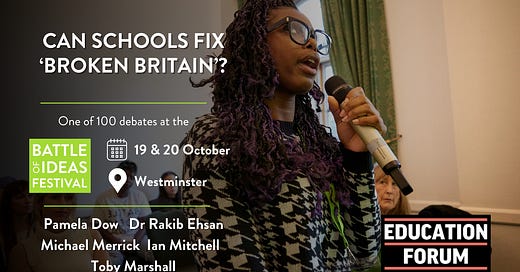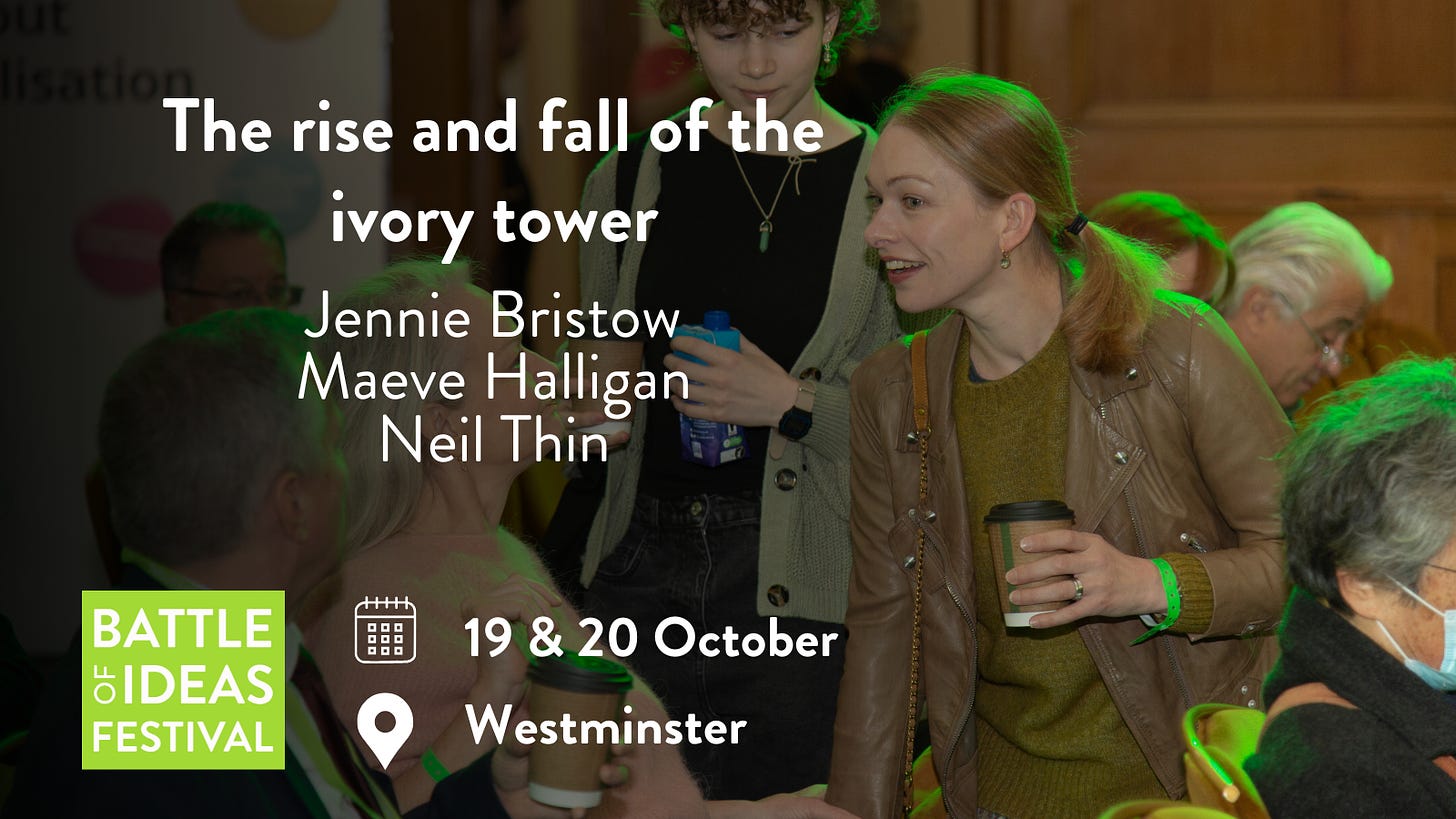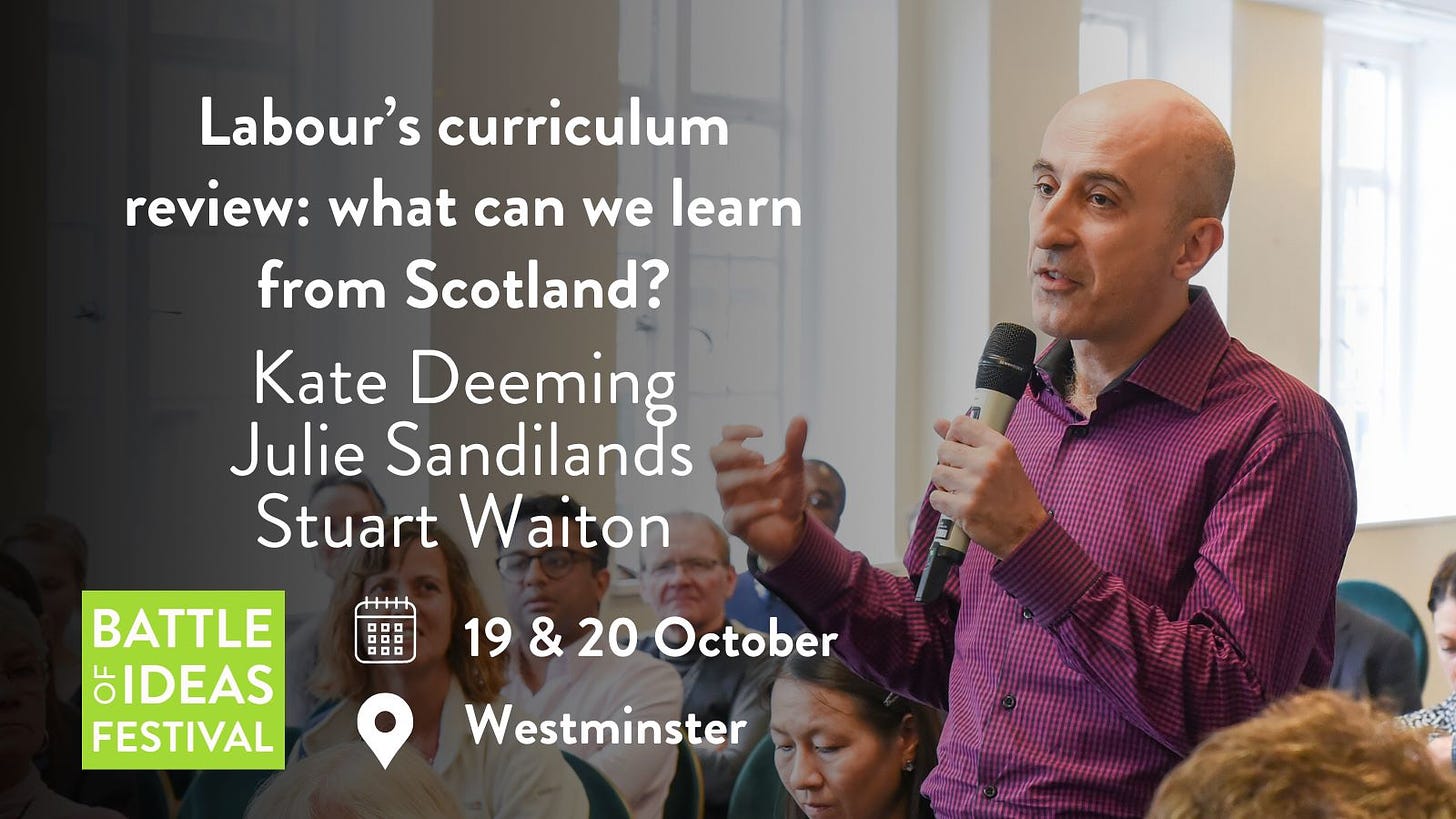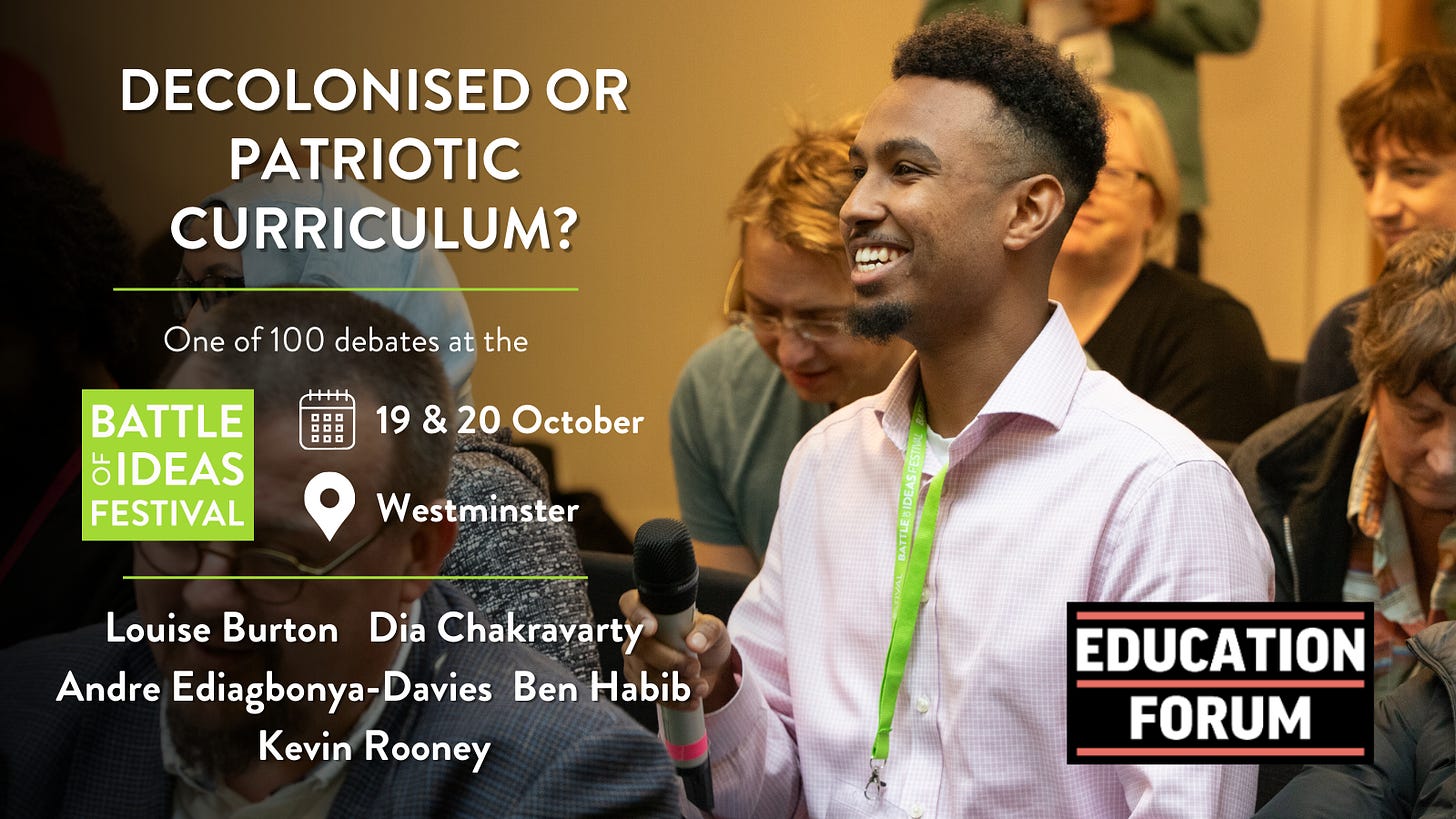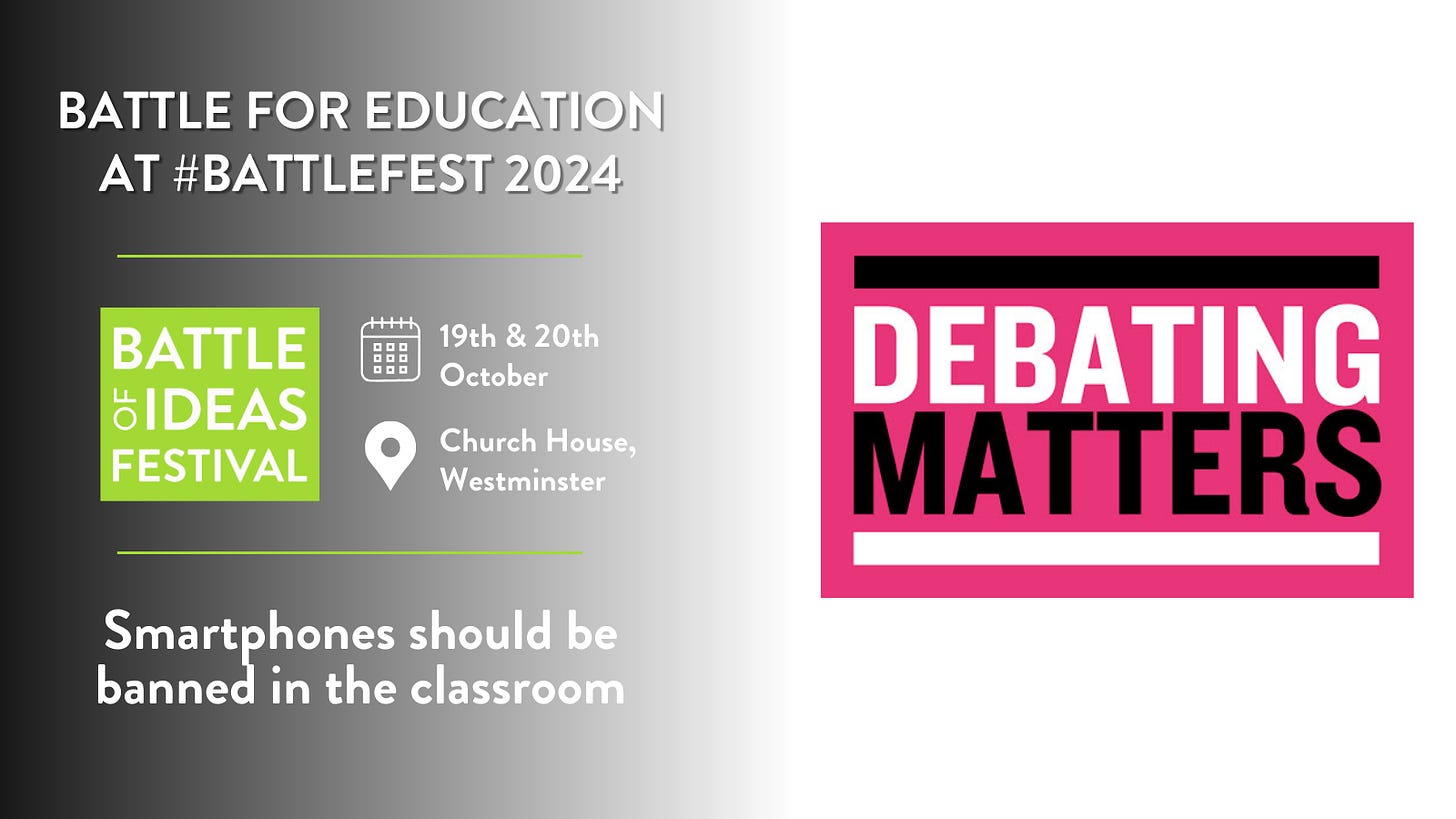The legacy of lockdown and the future of education
When a school shut its doors for a month, two years after the last national lockdown, parents decided to fight back. Dad Jon Bryan tells his story. PLUS our education debates at the Battle of Ideas.
Two years after the misery of Covid lockdowns, a school in the North East of England shut its doors to its pupils for over a month over damage caused by a storm. With no explanation to parents and carers, and pupils expected to learn ‘online’, the experience had all the echoes of lockdown without the silver lining of some national camaraderie.
In this guest Substack by father and trade-union organiser Jon Bryan, he details the legacy of lockdown on the world of education - and examines how the ‘new normal’ of post-pandemic life excused a whole month of missed education for over 2,000 school children.
At the Battle of Ideas festival this weekend, we’re dedicating a whole day of discussion to our BATTLE FOR EDUCATION STRAND. Read on for more details of those sessions, and make sure you buy your tickets for the Battle.
When a secondary school in Newcastle closed its doors to schoolchildren in the Autumn term of 2023, it was a reminder of tough times in the pandemic.
For many of us, the lockdowns in 2020 and 2021 are experiences we would rather not think about. Businesses shutting, the lack of social contact and the closure of schools to most children are all things we want to forget. Unfortunately, I was reminded of those challenging times when, exactly one year ago, the school my teenage children attend was shut for over a month. The legacy and impact of lockdown was there for all to see.
A school closes its doors
On 19 October 2023 - over two years after the last Covid-related lockdown - Jesmond Park Academy, a secondary school in the east end of Newcastle, closed its doors to 2,000 children. Some of the circumstances for this decision are still unclear, but the key question is: why did this happen? Why did one of the biggest schools in the North East, controlled by a large multi-academy trust (The Gosforth Group) decide to rely on online education for children as young as 11 for over 10 per cent of an academic year?
It is my view that a lockdown mentality, generated during the pandemic, led to the decision to totally shift to online education. Had it not been for the experiences that we went through in March 2020, no one would have thought that the way to deal with a problem was to close an institution’s doors to schoolchildren for weeks on end, and not to offer any face-to-face education.
Storm Babet
The UK was warned about Storm Babet in October 2023. Waking up on the morning after its arrival, children and their families were told that Jesmond Park Academy (JPA) would not be open that day. The text message read:
‘Urgent Message: Dear Parent/Carer, the school is closed today due to the high winds making the building unsafe. Kind regards, JPA.’
The BBC reported on the story and families were told there was work to do online. As a one-off emergency, and with no expectation of what was to come, this was relatively easy to deal with. In some ways, it was a bit of a novelty. A day off because of a storm would have had many children smiling, anticipating what they might do instead.
However, we were then told that the school was still going to be closed on the next day (Friday). And over the next week, daily updates were sent to families, all with the same message: ‘the school will remain closed’. Despite this becoming more difficult to deal with, half term was approaching, and lots of us thought that there would be a natural break to it all. Talk among families included speculation about building repairs - surely the school would be opening after half term. This would all amount to seven days of school missed, so perhaps it would not be too bad in the grand scheme of things.
What we did not know at the time was that the school had not yet assessed what the problem was, and whether it was safe. By the end of half term, instead of being told what the plans were for re-opening, we were told that the school would continue to be closed. Worse still, they could not give any indication of when this lockdown would be over. Some feared that the school might be closed until Christmas.
A fallen metal panel
As mentioned, the circumstances surrounding the closure has peculiarities. It had nothing to do with the RAAC panic (the concern about reinforced autoclaved aerated concrete in schools which was around at the same time) but with the safety of the school because of a fallen metal panel. You can see a photograph of this here. However, one of the peculiar aspects of the story was that other groups were using the school buildings, while schoolchildren were not. Local reports were that Newcastle Chinese School continued to use the building at the weekend, and a Model Railway Society were due to use the premises as well (although this was subsequently cancelled, presumably due to the uproar of the school being closed to its main clientele – schoolchildren).
By the end of half term, and as November started, enough was enough. I was one of those who wanted to do something about this. The school closure and online learning was not working. On 5 November 2023, I started a petition.
Campaigning to open the school
There had already been reports in the local press and on the radio, providing a voice to families to speak out. Social-media posts by the school were being heavily scrutinised, with negative comments or questions routinely deleted. Parents and carers had contacted local politicians, and they began to make their voices heard. One of them was the then shadow schools minister, Catherine McKinnell.
The demand to the Gosforth Group in the petition was simple:
We ask for the Chief Executive to call a meeting for parents and carers of Jesmond Park Academy to explain what happened, what the Trust intends to do in order to minimise the impact on our children, and to outline what lessons they have learned for the future.
Even though 100 people had signed in 24 hours, they refused to call a meeting.
The petition gathered momentum, with more people signing and sharing. I posted a thread on Twitter/X which gained over 76,000 views. Local media, including the Evening Chronicle and BBC Look North, continued to cover the story, amplifying the pressure being applied by various people across the local community. A few of us organised a meeting for those affected, and local councillors came along. Around 50 people turned up and spoke of their frustrations and how they wanted to do something. We used this to continue to put pressure on the Gosforth Group, and gain media attention for our cause.
The impact on families
Our experience was not simply analogous to previous lockdowns - in many ways, it was worse. For example, there was no prioritisation for the children of parents who were key workers. It was not a national lockdown that impacted on all of us - we were very much on our own. And there was no national instruction to work at home.
This latter point meant that some families were left in crisis about what to do with their 11-year-old child, who was only one month into their first year at secondary school. If they could not work from home, what could they do? What should they do? The anxiety for parents and carers, as well as the 2,000 kids, was very real. How do you prioritise the education of your children? Those in authority, who you are encouraged to look to in order to keep our children educated and safe, were not providing what was needed. The Gosforth Group was not responding to the concerns of children and families.
The re-opening
By Monday 27 November 2023, when the school finally re-opened its doors to all the students, over four weeks of schooling had been lost. The Gosforth Group’s chief executive and the chair of governors did eventually agree to hold a meeting for parents and carers, two and a half weeks after the school had re-opened. The anger of families had not yet fully dissipated, which was evident at those meetings.
Several people said to me that they felt that, had it not been for the actions of those who challenged what was going on, the lockdown mentality of keeping the school closed may well have lasted until January 2024. Given how quickly the school seemed to re-open and return to some sort of normality, that analysis is probably correct.
A year later
One year on, many of us want to forget about the grim time we had when our children were locked out and forced to rely solely on online education. As difficult as it was, it serves as useful reminder of the importance of education - and the need for it to be face-to-face. I will not forget it in a hurry, nor will I forget those at The Gosforth Group who allowed a lockdown mentality to direct their thinking. And I certainly won’t forget those parents and carers who thanked us for our work in putting the interests of our children at the centre of things, which is what education should be about.
Jon Bryan has been involved in trade unions all of his working life and has worked in further education colleges across the North East. Jon has a background in sociology and social research, and is a writer on gambling and an amateur poker player. Active in his local community, Jon is treasurer of The Great Debate, chair of the neighbourhood association where he and his family live, governor at a local primary school and sits on the board of the Ouseburn Learning Trust.
BATTLE FOR EDUCATION DISCUSSIONS INCLUDE:
Can schools fix ‘Broken Britain’?
Saturday 19 October, 10:15—11:45 in partnership with the Education Forum.
Education Secretary Bridget Phillipson has said she is launching a review of the curriculum in primary and secondary schools to ‘embed critical skills in lessons to arm our children against the disinformation, fake news and putrid conspiracy theories awash on social media’ and children will be taught how to spot extremist content. However, without any clear guidelines about what is considered extremist, who will determine what to spot? How will refocusing the curriculum (again) deal with wildly differing opinions far beyond the classroom on what constitutes fake news and conspiracies? And in today’s febrile climate, doesn’t this approach risk dragging schools into a one-sided explanation for the recent civil unrest?
SPEAKERS:
Pamela Dow, chief operating officer, Civic Future
Dr Rakib Ehsan, author, Beyond Grievance: what the Left gets wrong about ethnic minorities
Michael Merrick, director of schools, Diocese of Lancaster; former teacher; education and social commentator
Ian Mitchell, English literature and psychology teacher; writer, Teachwire; member, AoI Education Forum
Chair: Toby Marshall, film studies teacher; member, AoI Education Forum
The rise and fall of the ivory tower
Saturday 19 October, 12:15—13:30
The UK’s higher-education sector is in crisis, with 40 per cent of universities and other higher-education institutions expected to run a loss this financial year. Fewer 18-year-olds are electing to go to university. Courses are closing, academic redundancies are on the rise, students are dissatisfied, staff are demoralised, bureaucracy is increasing and, if you believe the hype, standards are falling. More universities are at risk of bankruptcy. Should we be bovvered?
SPEAKERS:
Jennie Bristow, reader in sociology, Canterbury Christ Church University; author, The Corona Generation: coming of age in a crisis and Growing Up in Lockdown
Maeve Halligan, student; musician; member, The Hooligans; student representative, Academics for Academic Freedom (AFAF)
Dr Neil Thin, author; honorary research fellow, social and political science, University of Edinburgh; former director of teaching, SPS Undergraduate School
Chair: Austin Williams, director, Future Cities Project; honorary research fellow, XJTLU, Suzhou, China; author, China’s Urban Revolution; series editor, Five Critical Essays.
Labour’s curriculum review: what can we learn from Scotland?
Saturday 19 October, 13:45—14:30 in association with the Scottish Union for Education.
The Labour government has launched a new Curriculum and Assessment Review. Some observers are pointing to Scotland as a potential blueprint for the kind of ‘progressive’ curriculum that Labour’s review may want to embrace. But should Scotland be a cautionary tale, rather than a model? Should parents get more say in what is taught, or is that best left to education experts? Are fears about the UK government’s review reasonable or is a review a useful exercise for a new administration to undertake?
SPEAKERS:
Kate Deeming, parent and supporters coordinator, Scottish Union for Education
Julie Sandilands, teacher; education commentator, Scottish Union for Education
Dr Stuart Waiton, senior lecturer, sociology and criminology, Abertay University; author, Scared of the Kids: curfews, crime and the regulation of young people; chair, Scottish Union for Education,
Chair: Penny Lewis, editor, Scottish Union for Education
Decolonised or patriotic curriculum?
Saturday 19 October, 14:45—16:15 in partnership with the Education Forum.
When it comes to fixing Britain’s internal divisions, would you prefer a decolonised or a patriotic curriculum? The National Education Union (NEU) argues that a decolonised school curriculum would ‘remove biases of the current system and provide a sense of belonging for black people’. In contrast, the Reform Party advocates a ‘patriotic curriculum that ensures people are proud of Britain’. Should education reflect one’s identity – be it British, black or gay – or be a means to moving beyond it? Is it socialisation or indoctrination to promote a decolonised or patriotic curriculum? Can schools be kept out of divisive politics and domestic culture wars, or should curriculum matters be left to the academic experts? Who should decide what schools teach?
SPEAKERS:
Louise Burton, history teacher
Dia Chakravarty, contributing editor, Daily Telegraph
Andre Ediagbonya-Davies, digital marketing officer; speaker, Academy of Ideas Education Forum
Ben Habib, founder and CEO, First Property Group plc; former deputy leader, Reform UK; former Brexit Party member, European Parliament
Chair: Kevin Rooney, history and politics teacher; editor, irishborderpoll.com; convenor, AoI Education Forum; co-author, The Blood Stained Poppy
Debating Matters: ‘Smartphones should be banned in the classroom’
Saturday 19 October, 16:45—18:15 in association with Debating Matters.
Debating Matters is a sixth-form debating competition that has become renowned for its rigorous and intellectually challenging format – one that values substance over style and getting to grips with real-world issues. This is a one-off showcase debate for the Battle of Ideas festival between students whose challenge is to think through the thorny moral issues at the heart of the motion and the audience is sure to enjoy the high standard of debate.
The use of smartphones by children has become the subject of widespread debate – both in Parliament and within society more broadly. Should smartphones be banned in the classroom?
DEBATE TEAMS:
Proposing the motion: The Burgate School
Opposing the motion: Oakwood Park Grammar School
JUDGES:
Murray Hancock, co-founder and convenor, The Brisbane Dialogues
Professor Ellie Lee, professor of family and parenting research, University of Kent, Canterbury; director, Centre for Parenting Culture Studies
Stan Swim, chief program officer, Bill of Rights Institute
Chair: Dr Mo Lovatt, national coordinator, Debating Matters; programme coordinator, Academy of Ideas

